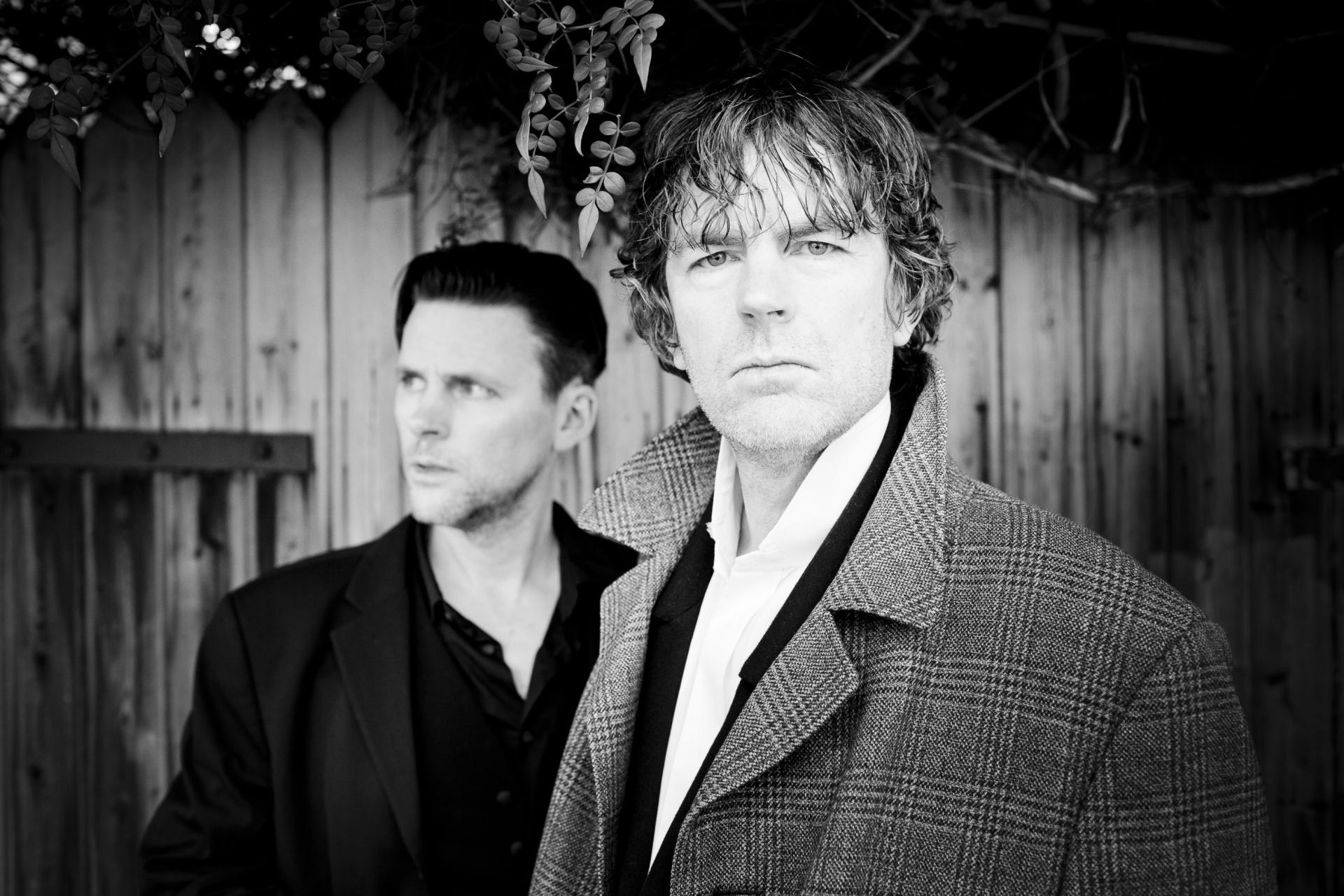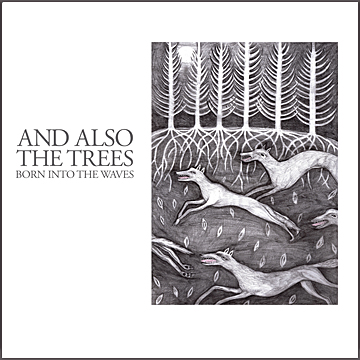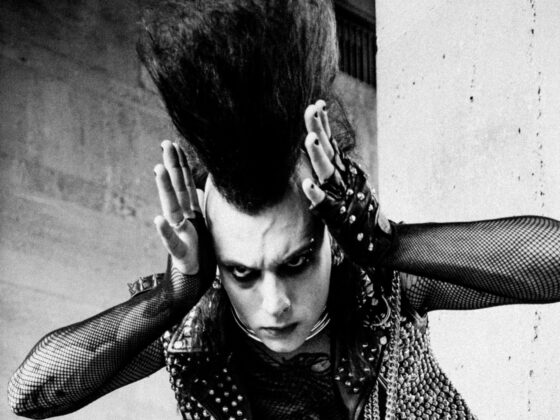[dropcap]They’ve[/dropcap] always been sort of an enigma. Pigeonholing them has, up to this very day, never worked out. But their discography speaks for itself: Formed in 1979 in Inkberrow, Worcestershire, And Also The Trees have never lost a step on their personal quest of reinventing themselves time and time again. The legendary John Peel once even called them “too English for the English”. With “Born Into The Waves”, their brand-new studio album, just being released, we were delighted to talk to singer Simon Huw Jones about the past, present and future of And Also The Trees.
Simon, thanks a lot for taking the time and granting this interview. “Born Into The Waves”, your 12th studio album in a career that already spans more than 35 years, has just been released. What’s the feeling like?
I’m pleased it’s finished and out there and pleased because, so far, people like it and understand it, and I have the feeling we might have created something of beauty or value. For me, there is also a kind of emptiness – because when we are working on an album I am thinking about the words or the music all the time. So when it’s done there is an emptiness. It’s strange how the cover of the CD/LP and the fact I can pick it up is important too. I like that. I need something I can hold and look at – and I find this record, its card and the illustration particularly satisfying. I’m not just saying that like an advertisement either – I personally seem to need the physical object to help it all make sense.
I wholeheartedly agree. Working on the new album took more than three years, which is nothing unusual for And Also The Trees. Since the band is spread out all over Europe, how do you guys actually collaborate on new songs? Is there any kind of procedure or routine you usually follow?
The fact we’re spread out doesn’t change much creatively – I always worked apart from the other members of the band. What is important is for Justin, who is the main composer, to be with Paul, the drummer, and Ian, or whoever is playing bass, in the same room and developing the musical ideas. Once they have something they are happy with, they send it to me and I start with the vocals and lyric ideas. I am guided by the music totally, it all comes from the music, although the music has to change to accommodate the vocal – so it’s quite a long process. It’s how I imagine it might be for an actor receiving scripts, I listen to the musical pieces and there are some, like “Bridges” or “Your Guess” for example, where I think I MUST have that part, nothing is going to stop me being getting this – and there are others where I have to immerse myself in the music for longer until I find my place. Sometimes there is no place for me.
“Born Into The Waves” is all about love, in its complex and different strains, light and dark, energizing and destructive. What has influenced you and the band, both lyrically and musically, while working on the new tracks, especially taking this everlasting and rather delicate main topic into consideration?
The theme of “the love song” came from when Justin presented me with the first four pieces of music – he just said “They are love songs, from different parts of the world” – so I kept that in mind – but it was more of a contemplation that strict brief, like an undercurrent. There are no traditional “love songs” on the album but it was interesting exploring the emotion and realizing the endless possibilities it suggests. We hardly scratched the surface but still, I think its presence is there and can be felt. The “different parts of the world” suggestion was actually equally important as we wanted to give a sense of place and distance. Of course you never know if your listening audience is going to pick up on these things, they are ideas, concepts, that we play around with.
To me personally, you’re one of the most fabulous lyricists I’ve ever read and listened to in all of, let’s call it alternative music. And “Born Into The Waves” further cements that legacy, at least in my eyes and ears. I especially love “Hawksmoor And The Savage” and “Seasons And The Storms”. Would you mind to elaborate a little on said two songs?
That’s very kind of you, Thomas. “Hawksmoor And The Savage” is unusually surreal for me. One way of understanding it is as a kind of writer’s journey down the stream of consciousness, as close as I’ll ever get – I hope – to writing a song about writing a song or about the creative process. But, as is often the case, the words work in other ways – even, in this case, as a way of presenting strong, single images which the listener interprets in his/her own way. “Seasons And The Storms” was difficult for me, it’s an upbeat tune and I found that any contribution I made to it was having a negative, sombre effect. So I made up my mind to write some words that were uplifting and positive. About happiness or beautiful things. Everything is rising or shining or smiling. Almost. And then, when I tried it all out, damn it, it sounded melancholic. Certainly more melancholic than it was supposed to sound, a bit like an excerpt from a Virginia Wolfe novel in a way. But it works, I’m happy with it anyway.
AATT also played their very first shows in Eastern Europe, for e.g. in Ukraine, Lithuania and Romania, as well as their debut in Tokyo, Japan since the last album came out. How much of an influence did these concerts have on the new material, if any at all? How was the reception in those countries?
They are life experiences, and they have come about because of our music. They heighten our awareness of the cultural differences and similarities, our awareness of different music and art and landscape – and as a musician you are in the privileged position of being able to communicate with people though music. This is quite special and can create an emotional bond. I have a feeling this influences our work in some way. The reception was very good in all these places but different. For example in the Ukraine, no one knew our music, except the promoter and his wife I think, and the audience was made up of students who didn’t know what to expect. Luckily they approved, strongly, and there was a feeling of excitement – maybe even wonder as I guess they had never seen anything quite like us before. And then in Tokyo there were people in the audience who had been following us since our first album in 1984, who knew our music very well but who never expected to see us in Japan and this was great too of course.
None of your albums has quite been like its predecessor, you – as a creative unit – have always strived for something new, something fresh. Would you ever have entertained the thought of still being an active band in 2016 back in 1979 when AATT were founded?
No. We were a group of kids who formed a punk band without knowing how to play our instruments, who thought that maybe we might get up on a stage somewhere and make a noise. Funny how things turned out.
Apart from playing a small tour throughout Europe in March and April, AATT are also going to perform two shows at the huge Wave Gotik Treffen festival in Leipzig. Of course you’ve been linked to New Wave, Post-Punk and later on even Goth in the past, without actually ever fulfilling all the necessary – and very tiresome – genre criteria, but still quite a big chunk of your following stems from that specific subculture and has been very loyal since your early days, if I’m not mistaken. What will differentiate these two festival gigs? It’s going to be your first appearance in their line-up since 2005.
You are right, you can’t easily put us into a genre – it makes us very difficult to ”market” as no one really knows where we belong in the music world. The people from, lets’s call them “the Dark Wave crowd” who like us probably also like Nick Cave and Tindersticks, maybe even Tom Waits, The Doors, Portishead, Mahler, Savages, Scott Walker, Bowie, Miles Davis etc. To be honest, what I think is unfortunate for us is that while we get media coverage from “the Dark Wave crowd”’ we get little from the other, more fashion conscious, areas of the media, especially in Germany and England. This, I believe, is down to marketing and the often less open minded view of mainstream journalists. The support we’ve had from “the Dark Wave crowd” has been instrumental in helping us to stay in existence all these years. At the WGT we’ll play a traditional AATT live set and a “Brothers Of The Trees” set, which is a new project of mine and Justin’s where we mix improvised, experimental pieces with rearranged And Also The Trees songs. Essentially it’s just the two of us but we want to be open to guest musicians both from our usual line up and from outside, so every show will be different. It’ll be our second Brothers Of The Trees performance and I hope more will follow.

How do you actually pick songs for your tour set lists? Is there any chance, apart from the brand-new songs, that also a few of the not-so-often-performed songs of the past will be included? “Prince Rupert” immediately comes to (my) mind, for example. I’d also *so* love to hear “So This Is Silence” live on stage.
Haha, you never know what will happen with Brothers Of The Trees – and neither do I yet. As we have two new musicians playing with us for the next AATT gigs we are rather limited in our choice of songs as they have had to learn a lot. We are always reviewing our catalogue though and considering old songs to be re-introduced. It’s important for us to have the latest album as the dominant atmosphere of the set – this is part of our evolution.
“Born Into The Waves” is being released independently once again by the band. Don’t you think that in this day and age a proper label still can be helpful, or did you simply prefer to have creative control over everything – from A to Z – on your own?
All of our last five albums since 2000 have been released on our own label. This way we have complete control over everything and we prefer to have that independence. Having said that, at the end of the 90s – which I suppose is when the “crisis” in the music business began, there weren’t really any labels that wanted us – not under our terms anyway. It is a lot of work when the time to release a new record comes around and the financial rewards are, well, very, very scant, but if you want to make music, the music you want to make – when you want to make it, there are many difficulties you have to face.
The question might appear a little naive and bland, but I’m always interested in getting to know which song of a current album is the personal favorite of the musician I’m talking to…
For a song to get on the album, we must have loved it at some point, people argue that we take way too long to write our music and we should be more easy going and free about what we put out. And they have a point, but we just can’t seem to go with that way of working. I think my favorite is “Bridges”. For where it takes me.
Let’s end our interview on a rather traditional note: Your hopes, plans and dreams for the future, Simon?
It would be great if we can survive as a band for long enough to write another album.
Thanks once again, Simon. Looking forward to seeing you perform in Leipzig immensely. Fingers crossed for the new album and the tour.
Thomas, thanks to you. Berlin has become a special place for us in the last few years, so I really hope we can play there again soon.
www.andalsothetrees.co.uk
Pick up Born into the Waves Here
TRACK LIST
1 YOUR GUESS
2 HAWKSMOOR AND THE SAVAGE
3 WINTER SEA
4 SEASONS AND THE STORMS
5 THE SLEEPERS
6 BRIDGES
7 THE BELLS OF ST. CHRISTOPHER’S
8 NAITO-SHINJUKU
9 BODEN
10 THE SKEINS OF LOVE
















 Or via:
Or via: